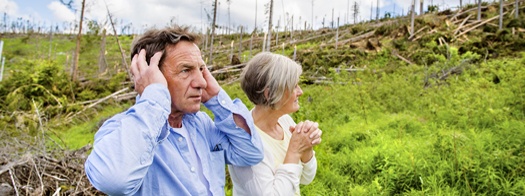
The devastation and wreckage of everyday lives left behind by Harvey and Irma is hard to imagine or visualize unless you’re on the ground in Texas or Florida. It’s in the big things like homes and schools and offices and stores and vehicles. It’s in the little things like pets and pictures and awards and diplomas and cozy chairs, favorite shoes and familiar cell phones that were daily refuge. Texans and Floridians driven into shelters are glad to be alive but are not sure who they are or where they belong. Overnight, their identity was mysteriously removed, and they can’t think beyond their next bite of food or available restful cot. They have no plans for tomorrow. They are not clear what tomorrow looks like. We furnish our everyday lives with things familiar (the stuff of our lives) that give us comfort and identity. Suddenly removed, we are left without context. We are traumatized and drift into post-traumatic-stress-syndrome without even realizing it.
Heroes
The Texans and Floridians driven into shelters are, for the most part, the elderly, the working class, the humble who can’t afford to lose a blade of grass.
- Texas, for example, is temporarily expanding the income limit for food stamps.
- The state is also temporarily expediting benefits, loosening restrictions on what people can buy with government aid, allowing schools to serve free meals to every student impacted by the hurricane – regardless of their income – and reimbursing people for food stamps that might have gone to waste because of the storm.
Heroes Among Heroes
The staff who are providing these human services are also victims of the storm’s fury, yet they continue to work on behalf of others at risk while their own lives may be in tatters.
“A lot of our case workers and a lot of people who do the frontline work are not financially well off,” says Russell Sykes of the American Public Human Services Association. “When something like this happens, they’re working 24/7, and they may be in the same situation as their clients…it’s a real test of the strength of the whole safety net. I hope what comes of it is a better understanding of how heroic these social workers are.”
They’ll Never Surrender
Stunned by their own loss, social workers in Texas and Florida still carry-on. After immediate needs have been met, the storm’s longer-term effects remain. The poor devastated people of Texas and Florida require continued resources and attention. Caseloads for years to come will reflect the psychological impact of trauma. People have seen their homes and jobs destroyed. Many have been dislocated and may find it necessary to start over in new unfamiliar communities. They will need ongoing help and support, particularly those who had the least before the storms hit.
We’re in This Together
Nonprofit organizations, as well, will need the support and resources to repair any organizational harm the storms caused so they can continue to do their share. Case workers will need help from out of state colleagues who may even have to temporarily replace them while they get their own lives stabilized. Nonprofits may be called upon to share resources in addition to personnel. Facilities and equipment, as well as temporary funding mechanisms, may have to be shared to support these heroes among the heroes devastated by Harvey and Irma. Being able to document and track the new information is going to be more important than ever. The entire nonprofit community will step-up to support our colleagues in Texas and Florida, as well as their partners and constituents... It’s who we are.

